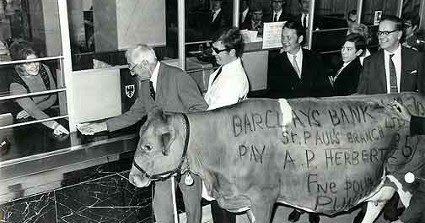Negotiable instrument
|
The Law and Lore of Repackaging
|
Negotiable instrument
/nɪˈgəʊʃiəbəl ˈɪnstrʊmənt/ (n.)
An instrument conferring a right to a payment of money or the delivery assets which the bearer can, without the issuer’s consent, transfer to a third party (a process known as, confusingly, as “negotiating”).
So I took my cow
And I cashed it against the wall.
I cashed it against the floor.
I cashed it against the body of a varsity cheerleader.
Cashed it against the hood of a car.
Cashed it against a 1981 Harley-Davidson.
And I ran upstairs to my parents’ bedroom, where
Mommy and Daddy were sleeping quietly in the moonlight. Slowly I opened the door —
Creeping into the shadows, right up to the foot of their bed,
I raised the cow high above my head,
And just as I was about to bring it crashing down —
My father woke up, screaming “STOP!!”
“Wait a minute! Stop it, boy! What do you think you’re doing?”
“That’s no way to treat an expensive negotiable instrument!”
And I said, “Goddamn it, Daddy: you know I love you,”
“But you’ve got a hell of a lot to learn about Rock ’n’ Roll.”
- —Jim Steinman, Love, Death and an American Milking Devon
Bills of exchange and cheques
A bill of exchange is a primordial means of extending credit, whose antecedents one would do well to understand, as quite a lot of contemporary business of extending credit depends on them. This stuff is not immediately intuitive, but when you get in to it, it has a logic of its own, and is rather fun. We recommend it.
Bills of exchange are governed by the elderly, but still in force, Bills of Exchange Act 1882, and are defined in section 2 as:
“an unconditional order in writing, addressed by one person to another, signed by the person giving it, requiring the person to whom it is addressed to pay on demand or at a fixed or determinable future time a sum certain in money to or to the order of a specified person, or to bearer”
Unpicking this there are three parties involved here: the “drawer”, who directs the “drawee” — typically a bank or moneybags of some kind with whom it has some kind of banking or credit facility, to pay a specified sum to the “payee”. The drawer will issue the bill to the payee in exchange for goods and services — hence a bill of exchange. The payee accepts it as good value for the goods and services, recognising it as an independent claim against the drawee for the payment of that sum of money according to the terms and conditions on the face of the bill.
When drawing a bill of exchange one must designate clearly who is drawer and drawee. Where the drawee is a bank, and the bill is payable upon demand, older readers may recognise the arrangement as a cheque.
The payee to whom the bill is issued need not be named. If she is, she may transfer the instrument by “indorsing” it (this may mean just signing it and delivering it to a third party). If she is not named, the bill will be payable on presentation by the bearer, whoever that happens to be. That is to say, title to the bill passes by mere delivery.
This “triangular” arrangement makes for uncertainty at the point of delivery, especially as the drawee is not represented. How does the payee know the drawee will honour the bill? This will depend on a preexisting arrangement to that effect between drawee and drawer, to which payee is not party or even witness.
So there are some complicated arrangements springing into life here:
- A transaction between drawer and payee whereby drawer issues a bill to drawee in (conditional) discharge of the consideration required for the payee’s goods or services.
- A payment obligation from drawee to payer which, if the drawee dishonours, triggers reinstatement of the drawer’s primary obligation to pay payee under the original transaction;
- A reimbursement obligation (or debit entitlement) from drawer to drawee whereby drawee may deduct the amount drawn from drawer’s account with drawee upon drawer2 settling drawer’s original payment obligation to payee. And this is before we even get to negotiation.
Derivatives fans may see this as redolent of a give-up.
Promissory notes and IOUs
A promissory note is just a special case of a bill of exchange where the drawer and the drawee are the same person, and the drawer thus draws the bill on itself — saying, effectively, “I direct myself to pay you this sum, only later”. It is an IOU, effectively. The implication that it will be paid not now, but later — if it could be honoured right now it would have no point: you would just pay cash — it has the general quality of a credit arrangement. Where the credit arrangement is in return for not goods and services but cash, a promissory note is a form of loan.
At a high level, debt securities closely resemble promissory notes. They are a form of securitised loan.
Negotiability
All this is further confused if the holder of a bill of exchange is entitled to negotiate it — to sell it, effectively, in the secondary market to a random third party.
If it is a “bearer” bill, one can negotiate it by simple delivery. If the bill is made out to specified payee, the payee can “indorse” it, by signing it.
You might think there is some scope for fraud here, and you might be right. There are many provisions on the Bills of Exchange Act to manage that contingency.
|
Premium content
Here the free bit runs out. Subscribers click 👉 here. New readers sign up 👉 here and, for ½ a weekly 🍺 go full ninja about all these juicy topics👇
|
See also
- Legal instrument and financial instrument
- A. P. Herbert’s magnificent The Negotiable Cow
- Rome II which excludes from its ambit non-contractual disputes arising out of the negotiable nature of negotiable instruments.
References
The way we lived then
Used to some comic effect in Anthony Trollope’s amusing Victorian door-stop, The Way We Live Now:
“When I.O.U.s have for some time passed freely in such a company as that now assembled the sudden introduction of a stranger is very disagreeable, particularly when that stranger intends to start for San Francisco on the following morning. If it could be arranged that the stranger should certainly lose, no doubt then he would be regarded as a godsend. Such strangers have ready money in their pockets, a portion of which would be felt to descend like a soft shower in a time of drought. When these dealings in unsecured paper have been going on for a considerable time real bank notes come to have a loveliness which they never possessed before. But should the stranger win, then there may arise complications incapable of any comfortable solution. In such a state of things some Herr Vossner must be called in, whose terms are apt to be ruinous. On this occasion things did not arrange themselves comfortably. From the very commencement Fisker won, and quite a budget of little papers fell into his possession, many of which were passed to him from the hands of Sir Felix, — bearing, however, a “G” intended to stand for Grasslough, or an “N” for Nidderdale, or a wonderful hieroglyphic which was known at the Beargarden to mean D. L ——, or Dolly Longestaffe, the fabricator of which was not present on the occasion. Then there was the M. G. of Miles Grendall, which was a species of paper peculiarly plentiful and very unattractive on these commercial occasions. Paul Montague hitherto had never given an I.O.U. at the Beargarden,—nor of late had our friend Sir Felix. On the present occasion Montague won, though not heavily. Sir Felix lost continually, and was almost the only loser. But Mr. Fisker won nearly all that was lost. He was to start for Liverpool by train at 8.30 a.m., and at 6 a.m. he counted up his bits of paper and found himself the winner of about £600. “I think that most of them came from you, Sir Felix,” he said,—handing the bundle across the table.”
“I dare say they did, but they are all good against these other fellows.” Then Fisker, with most perfect good humour, extracted one from the mass which indicated Dolly Longestaffe’s indebtedness to the amount of £50. “That’s Longestaffe,” said Felix, “and I’ll change that of course.” Then out of his pocket-book he extracted other minute documents bearing that M. G. which was so little esteemed among them, — and so made up the sum. “You seem to have £150 from Grasslough, £145 from Nidderdale, and £322 10s. from Grendall,” said the baronet. Then Sir Felix got up as though he had paid his score. Fisker, with smiling good humour, arranged the little bits of paper before him and looked round upon the company.

